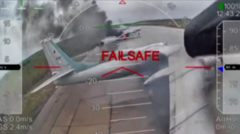This article explores Trump's call with Putin regarding Ukraine's drone strikes and the growing geopolitical tensions that follow.
Trump and Putin Discuss Ukraine’s Drone Attacks, Tensions Continue to Rise

Trump and Putin Discuss Ukraine’s Drone Attacks, Tensions Continue to Rise
Former President Trump reveals latest conversation with Russian President amid escalating conflict in Ukraine.
In a significant development regarding the ongoing conflict in Ukraine, former President Donald Trump disclosed details of a phone call with Russian President Vladimir Putin, during which Putin indicated an intention to retaliate against Ukraine following a recent drone attack. In a social media post, Trump characterized the conversation as productive yet lacking immediate prospects for peace. He notably did not share whether he attempted to persuade Putin against further aggression.
In a subsequent meeting held in Russia, President Putin refrained from directly addressing the drone strikes that targeted strategic locations. Instead, he concentrated on recent rail attacks that resulted in the deaths of seven individuals. Putin accused Ukrainian officials of deliberately provoking violence to sabotage any ongoing peace negotiations. Conversely, Ukrainian President Volodymyr Zelensky condemned Putin's actions as an effort to postpone discussions, particularly in light of an impending U.S. sanctions package.
While Ukraine has recently escalated its offensive operations, Russia remains the dominant force on the battlefield, continuing its assault on Ukrainian cities with a barrage of drones and missiles. This unfolding situation also led Trump to request Putin's assistance in reaching a nuclear agreement with Iran, claiming both leaders shared a consensus on preventing the Islamic Republic from acquiring nuclear weapons.
Further context reveals a growing optimism among European nations regarding their capacity to support Ukraine, even if Trump's engagement in the matter wanes. The recent drone offensive is indicative of a new phase in warfare that underscores the unpreparedness of Western nations to face such evolving threats.
In a subsequent meeting held in Russia, President Putin refrained from directly addressing the drone strikes that targeted strategic locations. Instead, he concentrated on recent rail attacks that resulted in the deaths of seven individuals. Putin accused Ukrainian officials of deliberately provoking violence to sabotage any ongoing peace negotiations. Conversely, Ukrainian President Volodymyr Zelensky condemned Putin's actions as an effort to postpone discussions, particularly in light of an impending U.S. sanctions package.
While Ukraine has recently escalated its offensive operations, Russia remains the dominant force on the battlefield, continuing its assault on Ukrainian cities with a barrage of drones and missiles. This unfolding situation also led Trump to request Putin's assistance in reaching a nuclear agreement with Iran, claiming both leaders shared a consensus on preventing the Islamic Republic from acquiring nuclear weapons.
Further context reveals a growing optimism among European nations regarding their capacity to support Ukraine, even if Trump's engagement in the matter wanes. The recent drone offensive is indicative of a new phase in warfare that underscores the unpreparedness of Western nations to face such evolving threats.





















